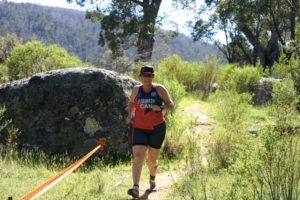Of flag and feather: Bobiwash competes in world off-road triathlon, carries flag for Canada

By Laura Young
SUDBURY – It was the flies around her punctured leg and ankle that convinced Helen Bobiwash she should probably withdraw from the World Cross International Triathlon Union (ITU) World Championships November 18-20 in Australia’s Snowy Mountains.
Up until that point in the race, the Sudbury-based accountant, mother and triathlete, though not necessarily in that order, was having the adventure of a lifetime Down Under.
She had led Team Canada into the opening ceremonies carrying a bald eagle feather along with the Canadian flag.
“I got a little emotional. They announced ‘and next is Team Canada’, the country where every American wants to move,” she recalls.
Team Canada selected Bobiwash, a member of Thessalon First Nation, after hearing her story.
“I just said I was an accountant by day but I felt like I’m a super hero by night,” she laughs.
The single mom had started racing triathlon in 2006 and other endurance sports for her fitness and to inspire her son.
A big part of the triathlon trip was a family vacation and to have the chance to show her son Mzhiikenh Toulouse, 13, the world.
“There are people who have different cultures and languages. He’s a citizen in a bigger world than the city of Sudbury. He had some amazing experiences. Hopefully he’ll carry it [with him] for the rest of his life,” she said at her kitchen table as she reflected on the trip.
Bobiwash was thrilled to carry the Canadian flag, not just to honour Canada but, she says, “for First Nations people, and women, and Sudbury. That I know going there that I’m not going to be on any podium, but to be able to be there and take part in the experience is an amazing gift I’ve been given.”
And it all began well. The day dawned bright and clear. Her 1.5km swim went well. On the bike, she was having a great time: the hills felt easy; the gravel didn’t bother her. She was descending to a bridge slowly and in control. Then, as she came under the bridge her handlebar hit a metal pole.
She flew off her bike and in the flight, her right foot extended and her pedal punctured her right ankle. She got up, looked at her shredded hands and tried to bike.
She told officials she was going to see how much further she could go. She thought of her son and how much she wanted him to see her finish. She thought about crossing the finish line with the Canadian Indigenous flag.
She finished the second lap of the bike course. When she rode through the site of the crash, the officials cheered.
She was telling herself to keep going until she couldn’t.
“That’s all I kept thinking. You came here for a reason. You wanted to see what you can do. Let’s just see it,” recalls Bobiwash.
The 10km run ahead was daunting. She pulled on her shoes and began, literally, putting one foot in front of the other. She stopped at an aid station to rinse her wounds and began running again, over hills, across a refreshing river full of glacial melt.
At another aid station, an official looked at her bleeding leg and reminded her of the time limit. He thought she wouldn’t make the cut off.
Bobiwash remembers him telling her she needed medical help.
“‘Look at your cuts. The flies are all over your cuts’,” recollects Bobiwash. “When he said that, I deflated and I said, ‘you’re right.’”
She left for the medical tent and Toulouse came to support and console her.
Bobiwash qualified for the world cross or off-road triathlon championships in 2015. She debated even bothering to train for it.
“It’s a big deal. People are super fit there and I was questioning my ability particularly on the mountain bike because that’s not my strength,” stated Bobiwash.
Bobiwash tries to live without regrets.
“Whatever the world opens up to me, just go for it and see what happens,” she says. “That was really what I decided. It’s there, let’s just try it.”
Still, a torn Achilles tendon in October 2015 nearly ruined her chances. After the orthopedic surgeon diagnosed the rupture, she told him about her goals and asked him if they were realistic. When he did not say no, she opted to stay focused on racing in Australia.
Within weeks she was back in the pool; she spent 12 weeks off her bike. Still, she slogged away. In June 2016, she finished faster than she had in the 2015 edition of the Mind over Matter race in Milton. That event put Australia and the worlds back on the front burner. She had five months to prepare.
She began regular physiotherapy treatments. She swam with her partner Glenn Woods in the lake. In September, she felt her speed returning. She made pottery and held fundraisers to help cover the costs of the trip.
After her accident in Australia, she recovered enough to race the team triathlon relay and lined up with the top women in the world.
Back in Canada, Bobiwash is now making time for family and Christmas. She has returned to training for the 2017 off-road XTERRA Global Offroad Series.
She wants to become proficient on her mountain bike, and not just because of her accident. She loves to ride in the woods.
“Just the environment you’re in to be on the trail where you hear the birds chirping and the chipmunks and squirrels are running around. You might see the occasional bear or deer. Hopefully not a snake,” she adds of her main phobia.

